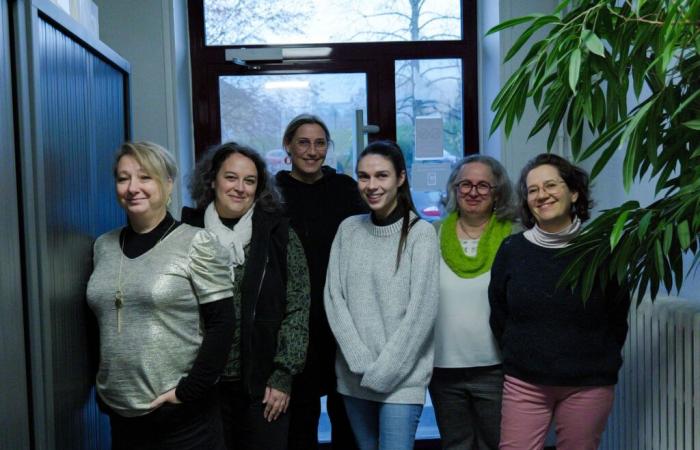With a budget of 53 million euros planned for 2025, disability constitutes the main social expenditure item of the Jura Departmental Council. A great opportunity to discover the daily work of the MDPH in favor of people with disabilities.
As part of its commitment to families and children with disabilities, the MDPH du Jura (Departmental House for Disabled People) deploys a range of services. Today, we give the floor to Bénédicte Thiellet, head of the Children-Adolescents Center, and Sylvie Nouzé, teacher specializing in disabilities and seconded to the MDPH du Jura, to understand the functioning and missions of this essential entity in supporting children. young Jura residents.
The MDPH du Jura is a one-stop shop which has, among other things, a mission to welcome, inform and support people with disabilities and/or their caregivers.
Parents want their child with a disability to be able to have full academic and social inclusion.
Today, two of our agents, Bénédicte, head of the Children-Adolescents Center, and Sylvie, teacher specializing in disabilities, present to you how it works and its role.
A word from our agents from the MDPH du Jura
Bénédicte, head of the Children-Adolescents Center at MDPH
- Can you introduce yourself and explain your role within the Children and Adolescents Center?
I am Bénédicte Thiellet, head of the Children-Adolescents Center at the MDPH since 2009. There are 2 other centers within the MDPH du Jura, the Adults Center and the Disability Compensation Benefits Center (PCH). Our team is made up of eight agents: three case managers, an evaluation manager, an education representative, two doctors (depending on geographic area) and myself. The center studies requests made for children and adolescents aged 0 to 20, and sometimes older for requests for school compensation.
My main missions: I am part of the evaluation team which includes all the agents of the center apart from the three case managers, present files to the committee on the rights and autonomy of disabled people (CDAPH), which is the decision-making body and also participates in meetings/meetings with partners.
- How does the processing of files take place and what types of support can be offered?
The file managers register the requests, ensure their admissibility as well as the completeness of the file. Depending on the type of request made, we may need additional information (academic, psychological, etc.).
We respond to requests for financial compensation (education allowance for disabled children / AEEH), educational (human support / AESH, adapted equipment / MPA, etc.) and medico-social (medical-social establishments and services / SESSAD, IME , DITEP, …).
When the file is complete, it is studied in a multidisciplinary team (EP) with the partners or in a small team with the center's evaluating agents.
The EP's member partners are: National Education, medical-social establishments and services (ESMS) and healthcare professionals (CMP, CAMSP). Other professionals may be invited if necessary depending on the child's situation.
The compensation proposals awarded are presented in CDAPH. Members validate or not these. The decisions taken are notified to the parents/legal representatives. When notification is made, it is up to the partners to put the compensation in place (CAF, National Education, ESMS.
- What are the main challenges faced by families?
When a file is submitted to the MDPH, parents have very often been confronted with the announcement of a diagnosis for their child beforehand. Its acceptance is already a test and a challenge. Whether there is recognition of disability or not, the pathways are more or less simple or complex depending on the needs of each child-adolescent (rehabilitation care, school, daily life, etc.).
-The difficulties often mentioned by families are:
- Access to care (lack of professionals in certain areas, waiting list) and their costs (rehabilitation/private care, transport).
- Taking into account the disorder or difficulties or disability and implementing adaptations within educational establishments. Particularly when these are barely visible or invisible such as certain neurodevelopmental disorders (specific learning disorders (dys…), attention disorder,) and certain sensory disabilities (hearing, visual).
It is important to remember that it is not because a child does not fall within the scope of disability and does not have notification of allocation of compensation that he or she does not have specific needs.
- What role do MDPH partners play in supporting families?
When a right to disability compensation is available, the partners concerned put it in place. The CAF or the MSA for AEEH payments, the National Education for school compensation and the ESMS for medico-social support. However, for these last 2 types of compensation, certain rights cannot be effective without delay. In fact, the available resources can slow down implementation (AESH for National Education and waiting list in ESMS).
When a child has educational compensation and a personalized schooling project (PPS) is developed, the disability reference teacher (ERH) in the child's school sector will set up a schooling monitoring team each year. (ESS) bringing together parents and professionals concerned by the child's situation. This meeting allows you to take stock of your education, your needs, your successes and your difficulties. The ERH helps, advises and supports parents in their approach to the MDPH. He also ensures the link with the teaching teams in the implementation of the PPS.
In the territory, the links between the children-adolescents center of the MDPH and the partners are an asset which make it possible to regularly discuss situations and avoid disruptions in the course as much as possible.
- What advice would you give to families considering applying for compensation?
For some, you already have to take the step of submitting a request to the MDPH. For parents who are oriented by a third party (medical, paramedical professional, teacher, etc.), it is important to know what the MDPH is, its missions, its role, etc. Parents can, in advance, contact an agent from the center children-adolescents to obtain information on the type of request to make, on the different compensations and also to help them fill out the form. This can be done with or without an appointment, directly or by telephone. The word “disability” is not easy to hear for all parents. It is sometimes important to discuss with parents the representations they have before submitting an application. Each situation is unique so each response must be tailored to the needs of the child concerned and their family.
Sylvie, teacher specializing in disabilities
- Can you explain your background and your role within the MDPH?
“My name is Sylvie Nouzé and I am a teacher specializing in disabilities, and I joined the MDPH last September following a secondment by National Education. Before that, I was a disability reference teacher, where I ensured the implementation and monitoring of students with a Personalized Schooling Project (PPS) in collaboration with families, schools and partners. Today, I prepare the multidisciplinary evaluation teams, where we analyze the children's files and we propose compensation to the CDAPH. »
- What are the main missions of the MDPH in providing educational support for children with disabilities?
We work hand in hand with National Education to offer adapted solutions. In collaboration with the reference teachers, we ensure that children with disabilities receive the necessary support, such as, for example, support for students with disabilities (AESH) or adapted educational materials. The priority is to adapt the school to the needs of each child, whether in a regular class or within ULIS systems.
- What options are available to families who want support for their child at school?
Before taking steps with the MDPH, families can benefit from numerous school adaptations within National Education, an educational team can be brought together in the school establishment. For primary school students, members of RASED (specialist support network for students in difficulty) can intervene. A PPRE (personalized educational success program) can be implemented in primary school or middle school. When this common law aid is not sufficient, the MDPH intervenes to assess the situation and propose suitable compensation solutions.
- You have a background rich in experience with students with disabilities. What motivated you to pursue this path at MDPH?
My experience as a reference teacher allowed me to understand the particular needs of students with disabilities and to monitor their progress. I found it particularly rewarding to help young people build their future plans, in collaboration with partners. My current role gives me a more global vision of each child and the different aspects of their journey, to offer them even better tailored support.
- A word for families who are hesitant to apply?
Do not hesitate to talk about it with the school, which is the first lever to meet your child's needs. If the adaptations within the establishment are not enough, the MDPH is there to offer compensation solutions. Our goal is to support each child according to their needs, so that they can flourish and progress peacefully.






